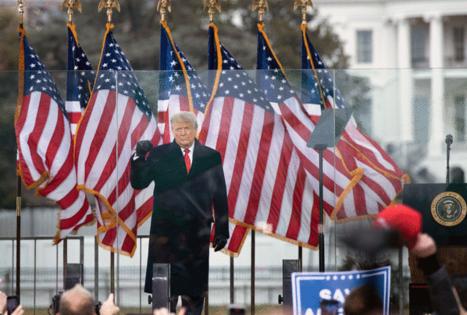Commentary: The voter fraud conversation is the wrong one to be having right now
Published in Op Eds
For the past decade, America has been mired in a repetitive, pointless conversation about “voter fraud,” helped in no small part by Donald Trump’s efforts to undermine voters’ faith in the electoral process.
During the presidential debate with Kamala Harris in early September, Trump insisted that he was the true winner of the 2020 election, and he has repeatedly hinted that he will not accept the election results this November if they are not in his favor. Since then, Trump and other GOP politicians have continued to put forward baseless arguments about voter fraud, including claims that Democrats are registering non-citizens and undocumented migrants to purposefully skew election results.
Time and time again, such claims have proven to be false. Across a variety of social science fields, the academic research consensus is that voter fraud is extremely rare in the United States. Furthermore, of the tiny number of instances that could qualify as voter fraud, most involve minor registration paperwork errors or physical damage to a ballot. Research about the 2016 and the 2020 elections finds scant evidence of fraudulent voting issues such as fake absentee or mail-in ballots, instances of double-registration, or non-citizens voting in state and federal elections. Overall, there is no reason to fear or believe that rampant voter fraud is compromising our elections. Nevertheless, this conversation continues.
Unfortunately, America is having the wrong conversation about voting. Even as we continue to be distracted by talk of voter fraud, the right to vote and the power of the average citizen’s vote are under dire threat, particularly for certain economic and racial groups.
This is not by accident.
In the last decade, a wave of policy, legislation and judicial rulings has made it unnecessarily harder for some Americans to vote, coming from the upper echelons of the Supreme Court to local county boards across this country. This is the conversation we need to be having.
Under “felon disenfranchisement” laws in some states, people with felony convictions lose their right to vote. In some instances, such penalties are permanent even after prison sentences are completed. Scholarly estimates suggest that several million Americans have been effectively locked out of our democracy. The American criminal justice system is already rife with inequalities, meaning the impact of felon disenfranchisement is disproportionately borne by poorer and non-white Americans.
Overall, the economic and racial composition of eligible American voters does not accurately resemble our country’s actual population and citizenry. This has had tangible impacts on voting patterns and several electoral results.
Additionally, the Supreme Court has adopted a highly permissive stance on state-level gerrymandering, i.e., the practice wherein a legislature redraws the lines of electoral districts in ways that mean one party is more likely to have a good outing on Election Day. Based on the judicial rationale that federal courts do not have the power to regulate state-level partisan gerrymandering, the court’s rulings in cases such as Rucho v. Common Cause (2019) and Alexander v. South Carolina State Conference of the NAACP (2024) have effectively given state-level legislatures a concerning level of freedom to redraw districts in ways that benefit the party in power. Gerrymandering is an absolutely undeniable fact in this country, and it has serious impacts for skewed election results.
In the 2013 case Shelby County v. Holder, the Supreme Court nullified the “preclearance” provision of the Voting Rights Act, meaning that states with documented policy and legislative histories of disadvantaging certain groups’ ability to vote no longer needed to gain federal approval before making changes to voting policies and practices. Immediately — in the span of 24 hours in some instances — several states unveiled new voter ID requirements, which research has shown to have disproportionate impacts on non-white and poorer Americans.
Meanwhile, the number of facilities where citizens can acquire a valid ID and/or cast their ballots decreased in many American communities, causing increasing wait times and miserable voter experiences, which can deter people from voting in the future. The impacts of these issues with voting infrastructure are also markedly unequal by race and class. Then, the Supreme Court’s ruling in Husted v. A. Phillip Randolph (2018) made it easier for states to purge voters from the registration rolls.
This was followed by an uptick in voter purges around the country, and some eligible voters have found themselves erroneously or prematurely removed from rolls. Voter purges have clear racial and class inequalities, and are particularly pronounced in areas that were subject to preclearance before the Shelby ruling. Overall, these changes have undeniably stopped many willing and eligible Americans from voting. Some scholars describe this state-of-affairs as a new era of voter suppression.
Equality in voting in America has been won via hard-fought battles. Women only gained the federal right to vote with the 19th Amendment in 1920, and several states during the Jim Crow era used poll taxes, grandfather clauses and outright violence to stop Black Americans from voting. And yet, in 2024, we continue to face policies and legislation that fundamentally violate the core democratic principle of “one person, one vote.” This hinders the voting process, skews election outcomes and ultimately undermines our democracy.
America is having the wrong conversation about voting. And it’s time we started having the right one.
____
Rajasekar is an assistant professor of sociology at University of Illinois Springfield and a public voices fellow with The OpEd Project.
____
©2024 The Fulcrum. Visit at thefulcrum.us. Distributed by Tribune Content Agency, LLC.




























































Comments